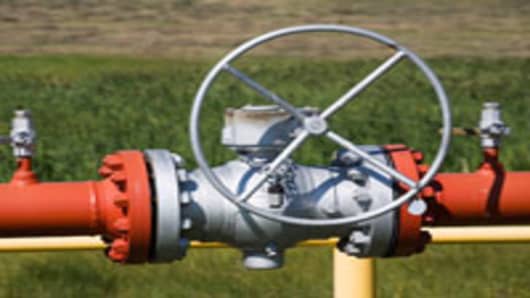Energy tycoon T. Boone Pickens has been proselytizing for some time now about what he thinks is a secret weapon to reduce America’s dependence on foreign oil: natural gas.
The U.S. is sitting on lots of it and right now it is dirt cheap.
“We looked at natural gas two years ago. We’ve been listening to Mr. Pickens,” Mark Schupan, president and CEO of Schupan & Sons told CNBC’s “Street Signs.”
Schupan’s scrap metal recycling business, with 380 employees and about $250 million in annual revenue last year, converted 16 of its trucks to run on nat gas.
Nat gas prices are at decade lows compared to sky-high oil prices, which were still over $100 a barrel on the Nymex, even with this week’s declines.
Consequently, the price of compressed natural gas (CNG), which powers nat gas vehicles, is about half the price of gasoline at the pump.
Taking advantage of the disparity, major U.S. contract freight carriers are deploying heavy-duty natural gas-powered trucks in increasing numbers, said Clean Energy Fuels , co-founded by Pickens. Clean Energy is the largest provider of natural gas fuel for transportation in North America.
“We know our carbon footprint will be significantly lower. We’re saving 9,000 barrels of oil…It is definitely the wave of the future,” said Schupan.
Investors on Wall Street are also betting on the future. On Friday, natural gas carrier operator GasLog began trading, after its initial public offering priced at $14 a share, raising $329 million.
Businesses and investors are not the only ones profiting from nat gas, American drivers who have jumped onto the bandwagon are also realizing big savings.
CNGPrices.com, which tracks prices at nat gas fueling stations around the country, reported the average price for compressed natural gas was $1.89 per gge, or a gallon gasoline equivalent. In other words, a gge of compressed natural gas will take drivers just as far as a gallon of gasoline. In some places, drivers can buy CNG for as little as $1.09 per gge.
Meanwhile, AAA’s Daily Fuel Gauge Reportshows that regular unleaded gas averaged $3.92 a gallon as of Friday.
On its website, CNGPrices.com uses this example:
“The Honda Civic GX has a CNG tank that holds about 8 "gallons" of CNG. To fill this up, it would cost about $16 if your CNG was $2/gge (which is not uncommon). The same Honda Civic that runs on gasoline would cost $32 to fill up 8 gallons if gas was $4/gallon. If you drove these cars around town, you would go exactly the same distance in the CNG Civic as the regular gasoline Civic, but for half the cost!”
Consider this: Americans spent $483 billion last year on gasoline, according to the Oil Price Information Service (OPIS). That’s $100 billion more than 2010.
So in a purely hypothetical world, if all cars and trucks ran on nat gas instead of gasoline, U.S. motorists would have saved about $240 billion in 2011.
“Imagine that kind of savings put back into the GDP,” said Chris Dillion, an analyst and broker at Tradition Energy in New York City.
Of course, the rules of supply and demand aren’t a part of this dream world, and neither are the problems of the lack of infrastructure to get the nat gas to the filling stations nor the scarcity of nat gas-enabled filling stations themselves.
But to the early adopters go the spoils.
Last year, the average American household spent $4,155 on gasoline or about 8.4 percent of their income, said OPIS.
Conversion kits that meet the Environmental Protection Agency’s strict standards are available, costing as little as $8,000 to install.
In his State of the Union address, President Obamasaid he’d seek a tax credit for buyers of nat gas-powered trucks equivalent to half the extra cost over the gasoline-only model.
While the Honda Civic GX is the only CNG-powered car, both General Motors and Chrysler announced earlier this month plans for pickup trucks that run on compressed natural gas and gasoline.
Chrysler's bi-fuel Ram 2500 heavy-duty pickup will cost about $12,000 more than a gasoline-only version. Pricing for GM’s bi-fuel 2013 Chevrolet Silverado and GMC Sierra 2500HD extended-cab pickups is not available yet.
Back at Schupan & Sons, CEO Mark Schupan predicted that, “if this works out, we believe we could go to 60 or 70 more trucks in the next two years.”
Tune in to “Street Signs” on Friday at 2pm ET. Brian Sullivan and Mandy Drury will be interviewing Clean Energy Fuels CEO Andrew Littlefair and Jimmy Haslam, CEO of Pilot Flying J, a major truck stop owner and operator.




